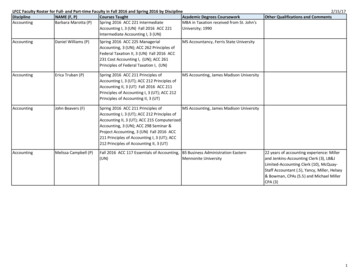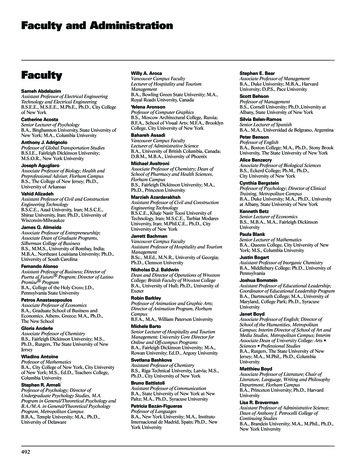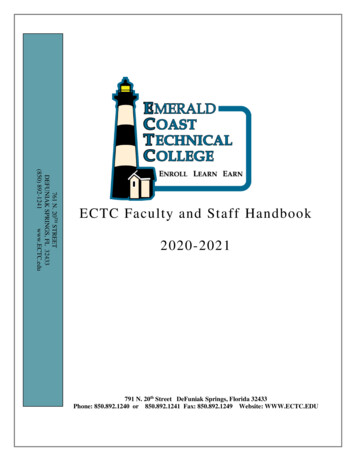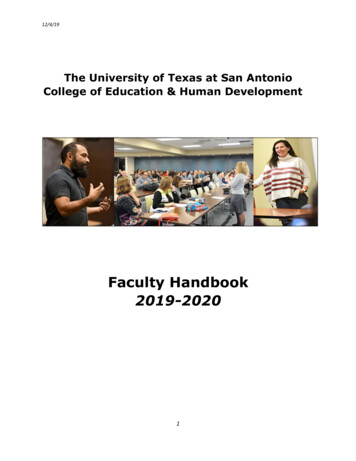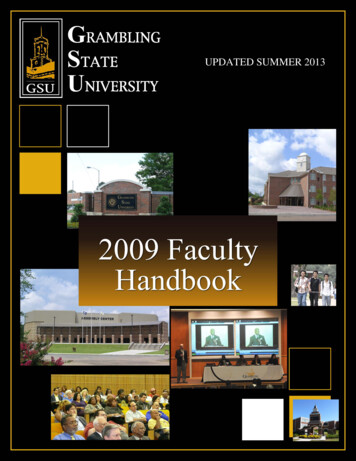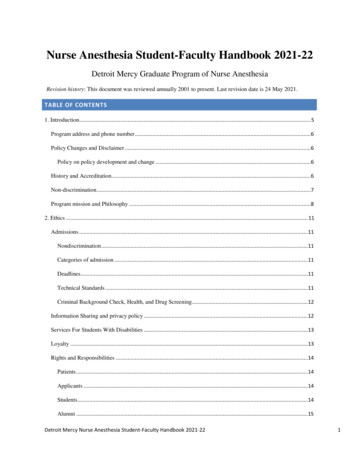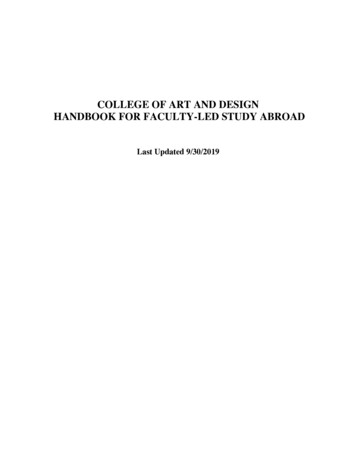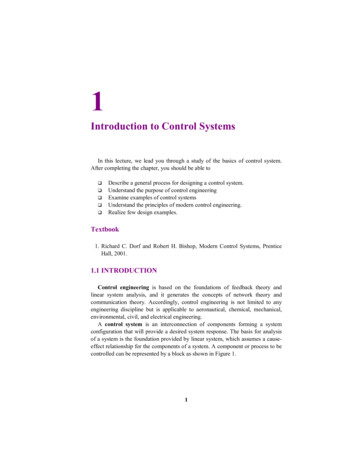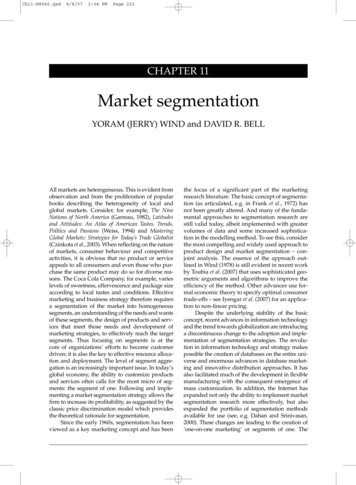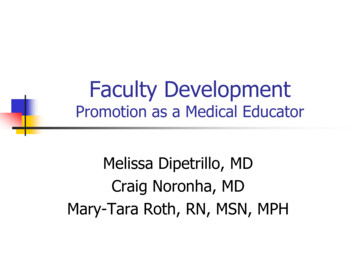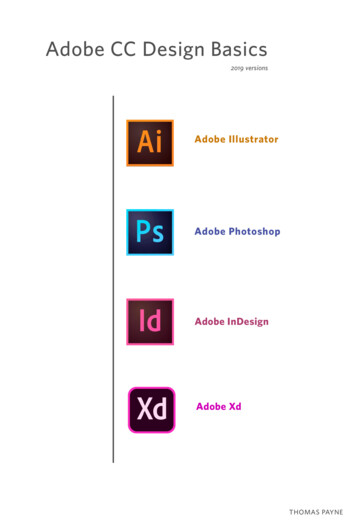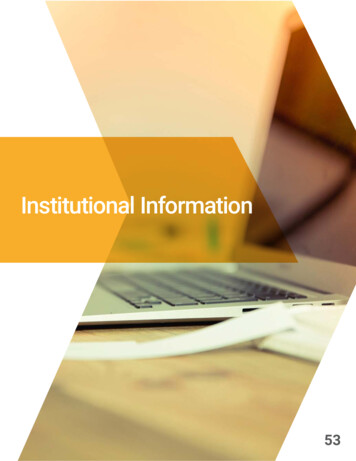
Transcription
Institutional Information53
Instructional DivisionsArts & Communications DivisionRoom: G138Phone: 972.860.7124Hours: M–F 8 a.m. – 5 p.m.Art Galleries, Arts Collective, Dance, Developmental Courses, Digital Media Technology, Drama, English, ESOL, Humanities,Music, Speech, The Alternative publication, Visual Art, and World LanguagesCareer Technologies DivisionRoom: T143Phone: 972.860.7143Hours: M–R 8 a.m. – 6 p.m.; F 8 a.m. – 5 p.m.Advanced Manufacturing/Mechatronics Technology, Air Conditioning and Refrigeration Technology (HVAC), Auto BodyTechnology, Automotive Technology, Business, Marketing and Human Resources, Business Office Systems and Support,Career Technologies, Computer Aided Design and Drafting (CADD), Electronics Programs, Honda Program, Renewable/Sustainable Energy, Toyota Program, and WeldingSTEM Science, Technology, Engineering, and Math DivisionRoom: C202Phone: 972.860.7297Hours: M–F 8 a.m. – 5 p.m.Biology, Chemistry, Computer Science, Mathematics, Engineering, Geology, Physical Education, and PhysicsSocial Science DivisionRoom: G237Phone: 972.860.7156Hours: M–F 9 a.m. – 5 p.m.Anthropology, Center for Child and Family Studies, Child Development, Criminal Justice, Government, History, HumanDevelopment, Learning Framework, Philosophy, Psychology, Social Work, Sociology, and Substance Abuse CounselingContinuing Education and Workforce Development DivisionRoom: W117Phone: 972.860.71144CommunityEd@dcccd.eduHours: 8 a.m. – 5 p.m.Health Care includes Certified Nurses Aid, CPR, EKG Technician, Medical Administrative Assistant, Medical Billing andCoding, Medial Law and Ethics, Medical Terminology, Patient Care Assistant, Pharmacy Technician Certification Reviewand Phlebotomy Technician.54
Instructional DivisionsPolice Academy (includes Basic Peace Officer Training)Room: W101Phone: 972.391.10844CJustice@dcccd.eduBusiness and ManagementIncludes Communication Skills for Managers, Entrepreneurial Studies, Leadership, Supervisory and Management, LeanTraining, Office Assistant, Project Management, Small Business, and Team Building.Journeyman Brewer and Technical Brewer ProgramTechnologyIncludes Beginning Computers, Computer Aided Design, Computer Basics, Graphic Design, Keyboarding, MS Office andWeb Development.Industry and TradesIncludes Heating, Ventilation, and Air Conditioning (HVAC), Electrical Pre-Apprenticeship Program, ACPE Approved IVTechnician Certificate, Computer Numerical Control (CNC), Machine Shop Training, and Mechatronics.Teacher Education Teaching Assistant ProgramRoom: W135Phone: 972.860.7346Corporate TrainingCustomized training programs including Technical Writing, Six Sigma, Lean Enterprise, DDI Programs, Customer Service,ISO Certification, Presentation Skills, Safety, Sales, Supply Chain Management, and Team Building.972.860.7113Language and LiteracyIncludes American Sign Language, ESL, ESOL, Foreign Language and Occupational Accent and Pronunciation, Life andLeisure, GED includes CAPM Exam Review, College Success Prep, GED Prep, GED Prep in Spanish, TAKS Math Performance.Camp Buzz Children’s Camp Program4campbuzz@dcccd.eduPhone: 972.860.711455
Core CurriculumThe core of learning in college is a set of coursesthat provide students with the knowledge, skills andeducational experiences needed to succeed in highereducation. Those classes — called the Core Curriculum— are the courses that lead to an associate degreefrom the colleges of DCCCD and which then transferto four-year colleges and universities. It’s a state lawthat students who complete the Core Curriculum withat least a 2.0 GPA are guaranteed that their courseswill transfer as a block of credit to any Texas publiccollege or university. Individual Core courses must beaccepted as well by the transfer institution.View the Core Curriculum courses in the degreeprograms, field of study degrees, emphasisdegrees and other certificate options in theDCCCD website. The DCCCD three-tieredapproach to building fundamental skills on asolid educational base includes the following:The Core Curriculum has its foundation in the idea ofa liberal education. A liberal education, in the words ofthe Association of American Colleges and Universities,“is an approach to learning that empowers individualsand prepares them to deal with complexity, diversityand change. A liberal education helps students developa sense of social responsibility, as well as strong andtransferable intellectual and practical skills.” That is thegoal of the Core Curriculum.Tier 1 – Core Foundations:Core courses encompass the bulk of the courses withinthe Associate in Sciences (A.S.), Associate in Arts (A.A.)and Associate of Arts in Teaching (A.A.T.) degrees (aswell as Field of Study and Emphasis degrees).Critical Reading and WritingSpeaking, Listening, Wellnessand the Human ExperienceQuantitative ReasoningTier 2 – Core DomainsQualitative Reasoning, Literacyand ResearchSelf and SocietyHumanity, Creativity andthe Aesthetic ExperienceScientific Discovery and SustainabilityTier 3 – Integrative LearningCritical Issues in the State-Federal Relationship56
Core CurriculumThere are nine Foundational Component Areas (FCA), including one Component Area Option (CAO). The CAO mayprovide options for students to choose additional courses from the other FCA. Each FCA has a component descriptionas definition, a set number of Semester Credit Hours (SCH) required for completion of a component, and specifiedcore objectives requirements. The nine FCA are:yyCommunication (6 SCH)yyAmerican History (6 SCH)yyMathematics (3 SCH)yyGovernment/Political Science (6 SCH)yyLife and Physical Sciences (6 SCH)yySocial and Behavioral Sciences (3 SCH)yy Language, Philosophy and Culture (3 SCH)yyThe Component Area Option (6 SCH)yyCreative Arts (3 SCH)5757
Student Learning OutcomesElements of the Texas Core Curriculum approved by the Texas Higher EducationCoordinating Board (THECB) and the Undergraduate Education Advisory Committeeinclude six core objectives and nine common component areas. Faculty are requiredto administer, collect, submit SACS core artifacts to comply with the SACS guidelines.Core Objectives: Critical Thinking Skills (CT) – creativethinking, innovation, inquiry, and analysis,evaluation and synthesis of information Teamwork (TW) – ability to consider differentpoints of view and to work effectively withothers to support a shared purpose or goal Communication Skills (COM) – effectivedevelopment, interpretation and expressionof ideas through written, oral andvisual communication Social Responsibility (SR) – interculturalcompetence, knowledge of civic responsibility,and the ability to engage effectively inregional, national, and global communities Empirical and Quantitative Skills (EQS) –manipulation and analysis of numericaldata or observable facts resulting ininformed conclusions Personal Responsibility (PR) – ability toconnect choices, actions and consequencesto ethical decision-makingStudent Learning Outcomes for Academic Course Guide Manual (ACGM) lower division courses are determined bythe state. Specific institutions are allowed to add learning outcomes, but not remove them. To find the exact learningoutcomes, consult the most recent “THECB Learning Outcome Report.”Elements of the Texas Core F/10751.PDF?CFID 86820013&CFTOKEN 9506651358
TSI (Texas Success Initiative)Scores & ResourcesThe Texas Success Initiative (TSI) Program is required by state law to ensure students enrolled in Texas publiccolleges possess the academic skills needed to perform effectively in college-level coursework. TSI includes a testingcomponent designed to identify and provide information about students’ reading, writing, and math skills. Studentsare expected to consult with the college TSI Coordinator in order to meet the TSI requirements. It is the student’sresponsibility to be aware of all TSI regulations. For more information, visit the Texas Higher Education CoordinatingBoard (THECB) Web site for details on HB 2223.Minimum Passing TSI StandardsThe college uses the following minimum passing standards todetermine a student's readiness to enroll in freshman-level academiccoursework. Refer to the DCCCD catalog for TSI Program details.*Note: These currentplacement scores aresubject to change.InstrumentState TSI Reading StandardState TSI Writing StandardState TSI Math StandardTSI Assessment*351 or aboveA placement score of at least 340,and an essay score of at least 4, ora placement score of less than 340,and an ABE Diagnostic level of atleast a 4, and an essay score of atleast 5*350 or aboveTSI Course PrerequisitesAll courses in the Core Curriculum and other courses requiredocumented college-level readiness in the appropriate contentarea before enrollment. In compliance with the work of theCurriculum Committees for courses, the college catalog willidentify, and the Course Master will regulate, prerequisitesfor these courses. No student shall be waived from prerequisiteswithout evidence of academic readiness. Students who havemet all of their TSI standards, course prerequisite requirements,and all other graduation requirements will be awarded theircertificate or degree. The college transcript will indicate astudent's readiness in reading, writing and mathematics.Please refer to the Eastfield College instructional divisionfor exceptions.59
Systemic Reports and Analytics &Learning CommunitiesSystemic Reports and AnalyticsView analytics in MyPortal to locate statistics on full time versus part time faculty numbers, enrollment, studentpersistence, retention, and success information, and workforce, employee and census data. Systemic reports onemployment, transfer updates and county census data is included.MyPortal Trail:DCCCD Portal Employee Information Colleges, Locations, Departments District Operations Public and Govt. Affairs Systemic Reporting and AnalyticsLearning CommunitiesLearning Communities are opportunities for students to have deep engagement in subjects with reinforcement ofconcepts, ideas, and materials.Learning Communities are programs in which a group of students enrolls in two or more courses organized around acommon theme, project or problem. The purpose of learning communities is to create a more integrated experience,to provide greater coherence in the curriculum and to increase collaboration of students and faculty in the pursuit oflearning.Refer to the EFC Learning Community Form of Intent sample attached.60
EFC Learning CommunityForm of Intent (Part A)EFC Learning Community Form of Intent (Part A)Proposals for new courses are accepted on an ongoing basis. Please refer to the timeline to ensure thatspecific deadlines are met. Each proposed learning community requires one proposal form to besubmitted to the learning community team. Refer to the proposal process for specific steps. Proposalprocess includes Form of Intent (Part A) and Application (Part B).Faculty Names:ELearning Community Title:Theme:Type of Learning Community:Flex CourseLinkedTeam-TaughtPLCoordinated CoursesPlease select the option that best represents your learning community:Faculty who have taught LCs together with the same theme (continuation).MFaculty who have never taught in a LC, first time to submit a proposal.Faculty who have taught LCs previously, but not together.Interest to teach in a learning community has been communicated to appropriate Dean(s)?SADate of Discussion:Course detailsExample:InstructorPreston, AmandaYoung, LaurenInstructorFall 201716 weeksDIRW 0310T/R 9:30amHDEV 0092T/R 11:00amTerm/Year# of weeksCourseDays/TimesCourseDays/Times# of weeksCourseDays/TimesCourseDays/TimesSpring 201816 weeksENGL 1301T/R 9:30amEDUC 1300T/R 11:00amTerm/Year# of weeksCourseDays/TimesCourseDays/Times# of weeksCourseDays/TimesCourseDays/Times61
Service LearningService learning is a teaching and learning strategy that integrates meaningful community service with instructionand reflection to enrich the learning experience, teach civic responsibility and strengthen communities.Faculty can benefit personally and professionally from integrating service learning into courses. Teaching withservice learning can:yyForm new ways of encouraging students' academic progress and comprehension.yyBuild avenues for greater understanding through intentional critical reflection.yyImprove the motivational base for instruction and learning.yyGenerate support and positive publicity in the community.yyEstablish relationships with people in the community.62
Honors CollegeThe Honors Program is designed for students who are interested in joining a community of scholars and who areinterested in improving their academic record in preparation for university transfer.Benefits include:yyParticipation in service learning, community service and leadership activities.yyAccess to small honors classes encouraging interaction and discussionyyFellowship with other motivated students who share common goalsyyHonors designation on transcripts helping to build stronger applications for scholarships anduniversity admissionsyyEnhanced ability to qualify for transfer into university honors programsyyAssignment to an Honors Program mentor who will provide individualized guidanceyyGreat preparation for university-level workStudents who meet the followingrequirements are encouraged toapply to the program:yyGPA of 3.5 for entering freshmen or currentstudents who have completed at least 12hours of college-level credityyTSI met in both reading and writingyy Good academic standing with EastfieldCollege and/or previous institutions attendedyyStudents who meet these requirementsmay complete the Honors StudentApplication Packet. Applicants willalso need to obtain two letters ofrecommendation. One must be from aformer instructor and the second may befrom an instructor or an advisor/counselorfamiliar with your academic work.6363
Standardized Classroom Signs forCancellations, Dismissal & Room ChangeTo reduce student confusion and to present aesthetic continuity, all EFC division offices must post signs to informstudents of class cancellations, class dismissals, room changes, and change of class times.yySign templates are available on the P-drive and at the Division offices and Evening/Weekend Administration(C236).yyAll information is to be typed into the sign template.yySigns must be posted according to the specified colors listed below.yyAll information posted on signs should be public information and must adhere to FERPA regulations.yySigns should be posted in a visible location and should not be posted with thumbtacks, pins, tape or othermaterials that will potentially damage walls or doors.yyDivision offices should remove signs when the information is no longer relevant.DefinitionsClass Cancellation — Class is cancelled for the entire semester.Class Dismissal — Class is not meeting for the scheduled class meeting time due to instructor absence.Room Change — Class is moved to a new campus location.Change of Class Time — Class is meeting at a new time.Sign ColorsClass Cancellation — Bright OrangeClass Dismissal — TanRoom Change — Light YellowChange of Class Time — Light Blue64
Concealed Carry(Also Known as Campus Carry)Concealed Carry refers to SB 11, which permits a licensed to carry (LTC) holder to carry a concealed handgun on orabout his or her person on the campus of an institution of higher education in Texas. Signed by the governor in June2015, the law went into effect for four-year colleges and universities on Aug. 1, 2016. The law is effective for DallasCounty Community College District and other community colleges in Texas beginning Aug. 1, 2017.What Concealed Carry Allows:yyThe law permits only licensed to carry (LTC) holders to carry concealed handguns on campuses.yyAllows an institution to adopt rules or regulations that prohibit licensed holders from carrying concealedhandguns on certain areas of campus, in a building or portion of a building as long as the rules and regulationsdo not have the effect of generally prohibiting a licensed holder from carrying a concealed handgun on campus.Effective notice must be provided with respect to any place where handguns may not be carried.What Concealed Carry Does Not Allow:yyThe law does not allow “Open Carry” on college campuses. Open carry means the intentional display of ahandgun, including the carry of a partially or wholly visible handgun stored in a shoulder or belt holster.yyThe law does not allow the carry of rifles or shotguns on college campuses.Current Law:Effective Aug. 1, 2017A Concealed Handgun License (CHL) holder may carry a concealed handgun on a two-year college campus’ public orprivate driveway, street, sidewalk or walkway, parking lot, parking garage or other parking area.A License to Carry (LTC) holder will also be able to carry a concealed handgun on or about her person on a two-yearcollege campus, including in buildings, unless prohibited by state or federal law, or college rule or regulation.DCCCD Concealed Carry Committee Report; Adopted PolicyDCCCD Concealed Carry PolicyDistrict Concealed Carry Committee Final Report (PDF - 1.81MB)Concealed Carry and the DCCCD Resource Slideshow65
Emergency Alert Message NotificationDCCCD Emergency Alerts will notify users on a variety of situations includingscheduled emergency preparedness drills, police activity or intruder lockdowns,power outages, shelter-in-place events, inclement weather and other events.You can opt in to receive emergency alerts by visiting the DCCCD Emergency Alerts Information section on eConnectvia the following breadcrumb trail:EConnect Employee Menu My Personal Information DCCCD Emergency Alerts InformationAlerts can be sent to mobile and landline phones, and email. You should also ensure that your Emergency Contactinformation is up to date.66
Contacting Police DispatchContacting Police DispatchEach college is connected to a central police dispatch for the entire district.To reach the College Police Dispatch:From a campus phone - Dial 911.From a non-campus or cell phone - Dial 972.860.4290Please note: This dispatchoffice is located atBrookhaven College.Your call is handled through the centralized dispatch systemfor all colleges and locations of the DCCCD. When contacting police, always identify yourself and the location(college, building, floor and room) that is of concern. If you are hearing impaired, you can also text the Campus PoliceDepartment dispatch at 972.860.4290.Here is a basic template forcalling the Dispatch:“Hello, my name is (insert name) andI’m calling from (name of college,building, and room number) about(describe emergency)”.67
Emergency Management Resources& Emergency Events DefinedEmergency Management Resources:Visit the DCCCD web page for emergencyprocedures guides, best practices andpublic health plans.All Clear: This message is sent when an emergencysituation is over.Emergency Evacuation: This occurs when there is anincident requiring evacuation of a building, such as afire or suspected/confirmed bomb in the building.Campus Closing: This means a location is closing dueto weather, power outage, water main break, etc.Incident Commander: This is the person in chargeduring an emergency. This individual will be the mostqualified content expert present for an incident.Inclement Weather: Weather that necessitates theclosing of a campus.Intruder Lockdown means an immediate threat at thecollege. Person(s) at the college are intent on causingharm to others.Police Activity Lockdown means that there is apotential threat near the college. For example, a robberysuspect being chased by police in the area.In both instances, if you are not already at the locationwith the lockdown, stay clear.Safer Zone: These are areas that most closely meetNOAA guidelines for severe weather. These will bemarked with a Safer Zone sign.Severe Weather Warning: Immediate threat of severeweather that requires taking immediate cover.68Shelte
55. Instructional Divisions. Police Academy (includes Basic Peace Officer Training) Room: W101. Phone:
